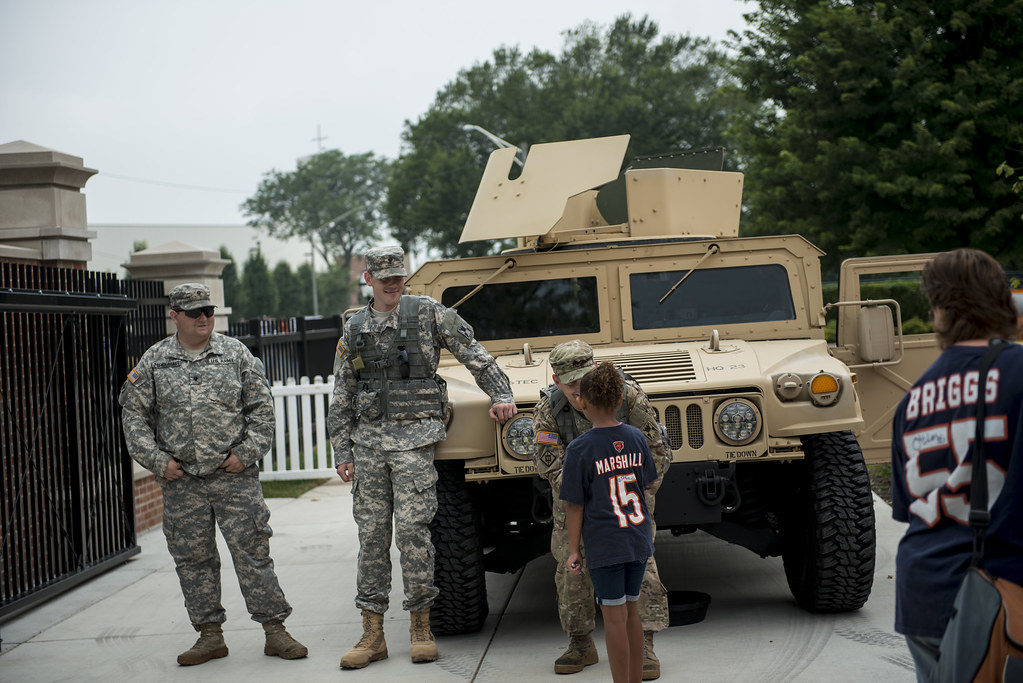Key Takeaways:
- A massive immigration enforcement plan in Chicago may use armored vehicles and National Guard support.
- Illinois leaders, including Governor J.B. Pritzker, call this move the “militarization of a city.”
- Former Trump administration attorney Jonathan Fahey argues the plan targets sanctuary policies and aims to remove criminal illegal immigrants.
- A federal judge has already blocked parts of the administration’s effort, citing overreach and funding threats.
- The debate mirrors past federal actions in Los Angeles and Washington, D.C., fueling fears of military-style law enforcement.
What Is the Chicago immigration crackdown Plan?
Late this summer, reports emerged of a sweeping Chicago immigration crackdown. The operation could deploy armored vehicles along with National Guard troops. Officials say they would model it after recent actions in Los Angeles. They view the move as a response to what they describe as lax local cooperation with federal immigration agents. As a result, they aim to detain and deport more noncitizens who commit crimes. Moreover, they hope to deter future illegal crossings near the city’s busy border corridors.
Why Are Illinois Leaders Opposed?
Meanwhile, Illinois’ top officials have voiced strong objections. Governor J.B. Pritzker referred to the plan as a direct threat to civil liberties. He said it resembles the militarization of a major American city. Chicago’s mayor and several lawmakers also condemned the idea. They fear that heavily armed units will erode trust between immigrant communities and local police. Furthermore, critics worry about innocent residents being swept up in broad enforcement sweeps. As a result, they have vowed to take legal and legislative steps to block the operation.
How Do Supporters Defend the Plan?
In a heated CNN discussion, anchor Boris Sanchez questioned Jonathan Fahey about the plan’s logic. Fahey argued the Chicago immigration crackdown is key to public safety. He blamed sanctuary policies for harboring illegal immigrants who have committed crimes. According to him, local officials refuse to hand over these individuals to federal agents. Therefore, he believes a forceful federal response is the only way to enforce immigration laws. He added that the plan would remove dangerous criminals and discourage others from attempting illegal entry.
What Legal Challenges Does the Plan Face?
However, federal judges have already intervened. Courts blocked parts of the administration’s earlier attempts to pressure sanctuary cities. For example, threats to withhold federal funding were deemed unlawful. As a result, the White House must find another path to compel local cooperation. Legal experts say the new Chicago immigration crackdown may trigger fresh lawsuits. They note that “alien harboring” statutes could apply if cities shield noncitizens. Consequently, federal courts might again restrain enforcement measures perceived as overstepping authority.
Could History Repeat?
Looking back, the Trump administration used similar tactics in Los Angeles and Washington, D.C. In those cases, heavily armed officers patrolled city streets. They detained migrants near shelters and public areas. Critics argue these actions created fear among immigrant families. They also led to protests and legal battles. Therefore, many worry Chicago could experience the same turmoil. Moreover, community groups have begun organizing to monitor federal agents. They plan to document any rights violations and challenge arrests they deem wrongful.
What Does This Mean for Chicago’s Future?
Chicago sits at a crossroads. On one hand, federal leaders promise tougher enforcement against criminal noncitizens. On the other, local officials insist they already work closely with immigration agents on serious crimes. They argue that broad sweeps risk alienating everyday residents who play vital roles in public safety. As the debate unfolds, both sides will likely intensify their campaigns. Federal authorities may refine the Chicago immigration crackdown plan to avoid legal pitfalls. Meanwhile, Illinois lawmakers could pass new rules limiting cooperation or diverting local resources to defend civil rights.
How Will Communities Respond?
Community groups have launched awareness drives. They urge immigrants to know their rights and seek legal help if approached by federal agents. Local nonprofits and lawyers offer “know your rights” workshops. Furthermore, some neighborhood associations plan to hold peaceful protests. They aim to pressure state and local leaders to resist the federal push. However, other residents support the idea. They believe stronger measures will stop drug trafficking and gang violence. Thus, public opinion in Chicago remains sharply divided on the proposed enforcement.
What Comes Next?
For now, the Chicago immigration crackdown remains a proposal. The administration must publish formal orders and guidelines. Then, federal courts will review any new directives for legal compliance. At the same time, Illinois leaders will continue their public outcry and legal moves. Moreover, national groups on both sides of the immigration debate will weigh in. Therefore, Chicago could become a major battleground over federal power and local rights. Ultimately, this showdown may shape how far the federal government can go in policing immigration inside big cities.
FAQs
What exactly does “immigration crackdown” mean in Chicago?
It refers to a large-scale federal plan to use armored vehicles and National Guard troops. The aim is to deport noncitizens who commit crimes. Officials also hope to deter new illegal crossings by showing a strong federal presence.
Why do some leaders call it “militarization”?
Critics say using military-style vehicles and troops in city streets creates fear. They worry it blurs the line between civilian law enforcement and a military operation. As a result, they see it as risking civil rights in immigrant neighborhoods.
Has any court blocked parts of this plan?
Yes. A federal judge previously blocked related funding threats against sanctuary cities. That ruling limits how the administration can pressure Illinois into sharing immigration suspects with ICE agents. Future measures may face similar legal challenges.
Could the Chicago immigration crackdown inspire other cities?
Possibly. If the plan moves forward without legal setbacks, federal authorities might try similar operations elsewhere. However, strong local pushback and court decisions could discourage expansion to other states.
